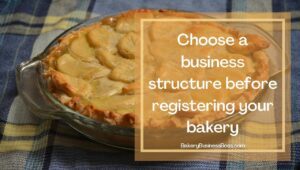Along with starting a bakery business comes the need for it to be properly registered. Registering your bakery not only protects your store and business interest but also gives you credibility and legitimacy as an enterprise. It’s, therefore, crucial to understand the importance of lawfully enlisting your bakery and taking the necessary steps to do so.
To register your bakery, you first need to officially register your business name, then obtain all necessary business licenses and permits, register for taxes, and secure business insurance to protect your assets and employees. Choosing a business structure that suits your bakery is a prerequisite of all these steps.
Failing to register your bakery can have serious consequences. Not only could you face fines or legal penalties, but you also run the risk of losing credibility with customers and partners. Furthermore, an unregistered bakery may struggle to secure loans or investments, making it more difficult to grow and succeed in the industry.
Choose a business structure before registering your bakery

Before you can begin to undertake the steps of registering your bakery, you need to decide on what type of business entity it will be. The four most common business structures are sole proprietorship, partnership, LLC, and corporation and what you choose will determine the legal and tax implications of your business, as well as the scope of your liability.
The most basic type of business structure is a sole proprietorship, in which the owner operates and holds complete control of the business and assumes personal responsibility for its debts and liabilities. On the other hand, a partnership is a joint venture between two or more individuals who share in both the profits and responsibilities of the business.
While both sole proprietorship and partnerships can be easy and inexpensive to set up, they both lack the protection and advantages of a corporation or limited liability company. As the sole proprietor, you are personally liable for any debts or lawsuits against the business, while partners in a partnership have unlimited personal liability. It is important to carefully consider the risks and benefits of each type of business structure before making a decision. An attorney or business advisor can help you weigh the options and choose the best structure for your particular business needs.
A Limited Liability Company (LLC) offers the best of both worlds by combining the liability protection of a corporation with the tax advantages of a partnership. A corporation is considered a distinct legal entity from its owners, providing its shareholders with limited liability protection.
Each of these structures has its unique benefits and drawbacks, so it’s important to consider your business goals, legal requirements, and tax implications before making a decision. Consulting with a legal or financial expert may help you make an informed decision.
Ways to Best Reduce Your Bakery’s Weaknesses
Register your business name
Establishing the unique identity of your bakery business starts with registering a distinct business name. Your business name should be reflective of the products and services you offer. It’s important to choose a name that will help you stand out from your competition and create a strong brand image.
Before registering your bakery name, it’s important to check its availability. You can do this by searching the business name database in your state or city. The database will let you know if the name you have chosen is already in use by another business. Otherwise, you can then register it with the relevant government agency.
The process of registering your bakery business name depends on your location, so it’s important to check with your local government agency to understand the specific requirements and procedures in your area. Once your business name is registered, it will become your legal identity, and you can start using it for all your business activities, including marketing, advertising, and banking.
Running a Bakery is Very Hard: Here’s Why
Obtain all necessary business licenses and permits

Depending on your location, you may be required to obtain specific licenses and permits to operate a bakery, including food service permits, health department licenses, and general or local business licenses. It is important to research the specific requirements in your area to determine the licenses and permits you may need to obtain and comply with so you can avoid paying fines and penalties.
- Apply for the necessary licenses and permits. Once you have determined the licenses and permits you need and where to get them, you can start applying for each with the relevant government agencies.
- Keep your licenses and permits up-to-date. Some licenses and permits may need to be renewed periodically, so it’s important to keep track of expiry dates and renew them promptly.
- Comply with all food safety regulations: In addition to obtaining the necessary licenses and permits, it is important to comply with all food safety regulations to ensure the quality and safety of your bread and pastries for sale.
Register for taxes
Next, you will need to complete the process of enlisting for taxes on the federal, state, and local levels, which includes income tax, sales tax, and payroll tax. Your bakery business will be considered a separate tax entity, and you will need to file regular tax returns, pay taxes on your business income, and withhold taxes from your employees.
Aside from registering for taxes, obtaining an Employer Identification Number (EIN) from the Internal Revenue Service (IRS) is a requirement as well. This unique nine-digit number is assigned to your business by the IRS and serves as its identifier for tax-related purposes. The application process for an EIN can be done through the internet, by sending a letter, or via fax.
Here are some additional points to consider when registering for taxes:
- Assess the tax responsibilities associated with your business structure: Understanding the tax consequences of the business structure you have selected is crucial as each structure carries varying tax responsibilities.
- Register for sales tax: Depending on your location, you may need to collect and remit sales tax on the products you sell in your bakery.
- Keep accurate financial records: Maintaining accurate financial records is crucial for complying with tax regulations and preparing accurate tax returns.
- Plan for estimated tax payments. Depending on the size of your business and the amount of taxes owed, you may need to make estimated tax payments throughout the year.
5 Reasons: Vegan Baking Is Possible
Secure business insurance
Lastly, securing business insurance is an important step in registering your bakery business. It provides financial protection against potential losses and lawsuits, which can help safeguard your personal and business assets. Several types of insurance are relevant to a bakery business, including liability insurance, property insurance, and workers’ compensation insurance.
Liability insurance protects your business against claims of injury or damage caused by your products, employees, or business operations. Property insurance covers damages to your business equipment, building, and inventory. On the other hand, workers’ compensation insurance is required in many states and provides coverage for employees who are injured or become ill as a result of their job.
It’s important to research and compare different insurance options to find the coverage that best suits your bakery business needs. Keep in mind that insurance requirements may vary depending on your location, business structure, and the size of your business. Consulting with an insurance agent or a legal expert can help you make an informed decision and ensure that you have the necessary coverage to protect your business.
Conclusion

Registering your bakery business is a vital step in establishing its legitimacy and securing its financial stability. The process of registering your bakery involves five main steps: registering your business name, obtaining all necessary licenses and permits, registering for taxes, and securing business insurance. But before you can take these steps, you have to choose a suitable business structure. Once your bakery is registered, you can say that you have created a strong foundation for your business and set yourself up for success in the industry.
Frequently Asked Questions
A bakery can be registered online; however, the requirements may vary based on the location. Some places may require an in-person visit to the local department of health, while others may allow for the entire registration process to be completed through their website.
Common mistakes when naming a bakery include choosing a name that is too generic, hard to spell, or difficult to remember. Avoid using inside jokes or puns that only a small group of people will understand.
To learn more on how to start your own bakery business check out my startup documents here
This blog post is provided for informational purposes only. The information contained is not intended to constitute legal advice or to substitute for obtaining legal advice from a qualified attorney.

About the author. Entrepreneur and Bakery Business Fan.
Hi! I am Shawn and I am a happy individual who happens to be an entrepreneur. I have owned several types of businesses in my life from a coffee shop to an import and export business to an online review business plus a few more and now I create online bakery business resources for those interested in starting new ventures. It’s demanding work but I love it. I do it for those passionate about their business and their goals. That’s why when I meet a bakery business owner, I see myself. I know how hard the struggle is to retain customers, find good employees and keep the business growing all while trying to stay competitive.
That’s why I created Bakery Business Boss: I want to help bakery business owners like you build a thriving business that brings you endless joy and supports your ideal lifestyle.

